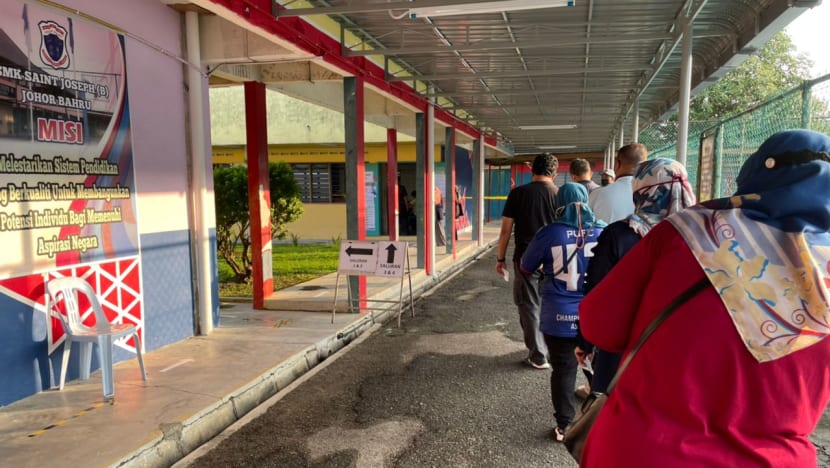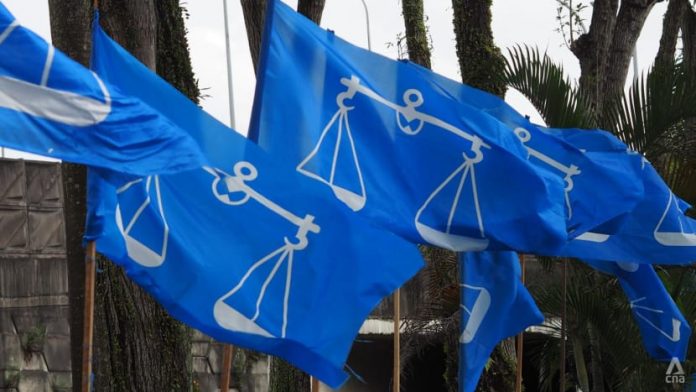As the party’s birthplace, Johor had always been an UMNO fortress – until Malaysia’s 2018 General Election (GE14) when Johoreans awoke to the shock of losing their state and the country to the opposition.
The United Malays National Organisation-led Barisan Nasional (BN) coalition returned to power in the Johor state election on Saturday (Mar 12). An emphatic win by any definition, sweeping 40 out of 56 state assembly seats.
But why have voters come back into the arms of BN? All discussions must begin with the role of the former prime minister Najib Razak.
Najib has received adulation while on the recent campaign trail for BN. Voters clamoured to meet him wherever he went. All the attention provided a platform to strengthen his almost cult-like following and cemented his status as a pivotal entity in Malaysian politics.
This is a complete turnaround in fortunes for Najib.
VOTER REGRET AND POWER STRUGGLES SINCE GE14
During GE14, BN campaign paraphernalia avoided all imagery and mention of him given the stigma associated with the 1MDB scandal. Traditional UMNO voters who opted for the opposition out of frustration with 1MDB and increasing personal difficulties did not expect that their vote would have such a devastating impact. Some even expressed immediate regret.
Voters’ expectations of the Pakatan Harapan (PH) government were high. But elation quickly dissipated after the implementation of the Sales and Services Tax and when other initiatives did not translate into visible improvements for the average person. Many were also swayed by the ever-present anti-PH propaganda, which deepened suspicions and ethnic divides.
Then came the sudden change of government in 2020, broadly seen as the result of then prime pinister Mahathir Mohamed and opposition leader Anwar Ibrahim’s never-ending tussle for power; followed by the COVID-19 pandemic.
Economic, health and other problems left the people reeling. In Johor, the pain cut much more deeply as the critical Singapore-Malaysia land border closed. Malaysian workers could not make their daily and weekly commute; some were separated from their families for a long time. Singapore visitors that fed Johor’s economy were locked out.
All of this convinced the traditional BN supporter that they had made a serious mistake in GE14.
In my conversations and interviews with people over the pandemic period, many rued the unexpected reign of PH and the perceived ineffectiveness of the subsequent Perikatan Nasional (PN) government and Muhyiddin Yassin.
They longed for the relative stability under Najib, deftly rebranded as “Bossku”; his alleged transgressions quickly forgotten. At least during his time, they often told me, they could get aid for some problems. Under PH, they got nothing, and everything just got worse.
Fast forward to 2022: The recent state elections saw UMNO stalwarts coming out in force to make sure their “mistake” was not repeated.
For many, this was a vote of repentance. For some, it was an apology for believing the “false accusations” against Najib. For others, it was the belief in the campaign promise that only BN could return Johor to economic stability, or at least provide some personal relief like in the past.

A CROWDED FIELD OF NEW AND OLD FACES
Voters in a state election just want a familiar face with a local track record who can provide tangible help in times of need. And with a number of new parties contesting, even with local candidates, voters were simply bewildered by the sea of unfamiliar logos and faces.
Only the Malaysian United Democratic Alliance (MUDA) managed to garner one seat. Other parties, like Parti Pejuang Tanah Air (Pejuang) and Parti Warisan (Warisan) fared so badly that many candidates lost their election deposits. In my conversations with people, it is clear there is no real understanding of an assemblyman’s role as a lawmaker and policymaker.
While the electorate has often demanded younger political representatives, some reactions reflected doubt that candidates aged below 35, especially women, had enough clout and experience to get anything done.
Muhamad Airel Zbidin, Pejuang’s candidate for Tangkak, and Kelly Chye Pei Yee, the Malaysian Chinese Association (MCA) candidate for Mengkibol, both aged 26, were two of the youngest candidates of eight who were under 30 years old. They both lost, but MUDA’s Amira Aisya Abd Aziz, 27, won a seat in Puteri Wangsa.
But even well-established political players could not translate their influence into winning votes for their candidates.
Voters took their vote elsewhere after Parti Keadilan Rakyat’s (PKR) refusal to campaign under the PH flag cemented their dim view of the coalition and its internal discord, attributed largely to a belief in Anwar Ibrahim’s insatiable desire for power.
Pejuang’s poor showing, with votes almost consistently in the low hundreds, was also the result of a widespread local aversion to Mahathir Mohamed, a long-time adversary to the Johor Sultan.
Mahathir’s role in the Sheraton Move did not help. Many saw it as his intention to thwart Anwar’s promised promotion to prime minister that led to the collapse of the PH coalition and subsequently the PH government.
The PN coalition was able to make some inroads, taking three seats. But voters remained dissatisfied with former prime minister Muhyiddin’s handling of the COVID-19 pandemic and the subsequent economic fallout. Others see him as a traitor for leaving UMNO and constantly attacking his former party and Najib.
While there was much fanfare over first-time (Undi18) voters given the lowering of the voting age to 18, they only account for 6.67 per cent of Johor voters. Even if they did all go out to vote, their impact would be minimal.
While social media tracking, especially on Twitter, showed that some were heading back to the state to “vote for change”, it is not yet clear what “change” they were referring to.
A HOLLOW WIN GIVEN THE LOW TURNOUT
The map of Johor might look like it has turned almost completely BN blue, but the picture of actual support may be less clear.
A closer look at the numbers reveals that while BN holds 71 per cent of state assembly seats, actual voting percentages based on myUNDI website figures show that this is about 43 per cent of those who voted, or only 23 per cent of the electorate including those who did not show up at the polls.
When we consider that 56.9 per cent voted for any other candidate besides BN, it looks like they only earned a broad mandate because the opposition was not united under one banner. More importantly, it is also because of Malaysia’s first-past-the-post electoral system.
The 54.92 per cent voter turnout was effectively an indication that many Johor voters were protesting the elections – with almost half the population deciding not to vote for myriad reasons.
Pre-polling day conversations and interviews revealed that this ranged from frustration with politicians on all sides to disagreement that an election was even necessary, political apathy and the disbelief that voting will have any positive impact on their lives, as well as a fear of COVID-19 infection.
As the winning parties talk up the prospects of national elections to shore up their support, it might be prudent to pay heed to the actual numbers and sentiment behind the broad sweep of blue.
In the meantime, voters are waiting to see if conditions in Johor do improve, and how speedily the borders can truly reopen to pre-COVID levels. The electorate will need more proof of the pudding before it returns any politician or party to federal power. It is a lesson they learnt from 2018.
By Serina Rahman / channelnewsasia
The views and opinions expressed in this article are solely those of the author and do not necessarily reflect the position of AsiaWE Review.




